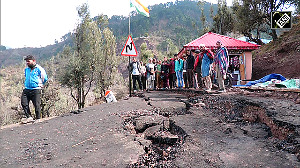That is among the 13 recommendations on Iraq to Washington in a report prepared by the Brookings Institution, one of America's foremost thinktanks.
The strife in Iraq could not only create millions of refugees, it could even lead to a regional catastrophe by disrupting oil supplies and spark a direct confrontation between the US and Iran, warns the report, titled Things Fall Apart: Containing The Spillover From An Iraqi Civil War.
'With each passing day, Iraq sinks deeper into the abyss of civil war,' says the introduction to the report by Daniel L Byman and Kenneth M. Pollack of the Institution's Saban Center for Middle East Policy.
'President George W Bush has staked everything on one last-chance effort to quell the fighting and jumpstart a process of political reconciliation and economic reconstruction. Should this last effort fail, the United States is likely to very quickly have to determine how best to handle an Iraq that will be erupting into Bosnia- or Lebanon-style all-out civil war. The history of such wars is that they are disastrous for all parties, but the United States will have little choice but to try to stave off disaster as best it can,' it says.
'If Iraq spirals into an all-out civil war, the United States will have its work cut out attempting to prevent spillover from destabilizing the Middle East and threatening key governments, particularly Saudi Arabia,' it says.
'Washington will have to devise strategies towards Iraq and its neighbors that can deal with the problems of refugees, minimize terrorist attacks emanating from Iraq, dampen the anger in neighboring populations caused by the conflict, prevent an outbreak of secession fever, keep Iraq's neighbors from intervening, and help ameliorate economic problems that could breed further political or security concerns.'
'This will not be easy. In fact, the history of states trying to contain the spillover from civil wars suggests that it is most likely that the United States will be unable to do so. But if Iraq does descend into an all-out civil war, America will have to try.'
After examining the 'history of some dozen recent civil wars to reveal the general patterns by which such conflicts can "spill over" into neighboring states, causing further civil wars or regional conflicts,' the paper concludes that 'historically, six patterns of spillover have been the most harmful in other cases of all-out civil war: refugees; terrorism; radicalization of neighboring populations; secession that breeds secessionism; economic losses; and, neighborly interventions.'
'We hope that the leaders of the United States and Iraq will find a way to stop what seems to be an irrevocable slide into all-out civil war. Given their repeated failures to do so, and how badly the situation had deteriorated by the time this report went to press, however, we believe that the United States and its allies must begin thinking about how to deal with the consequences of massive failure in Iraq,' says the report.
It then goes on to prescribe 13 steps that the US must take in order to contain the fallout of a full-scale civil war:
- Don't try to pick winners;
- Avoid active support for partition (for now);
- Don't dump the problem on the United Nations;
- Pull back from Iraqi population centers;
- Provide support to Iraq's neighbors;
- Bolster regional stability;
- Dissuade foreign intervention;
- Lay down "red lines" to Iran;
- Establish a Contact Group;
- Prepare for oil supply disruptions;
- Manage the Kurds;
- Strike at terrorist facilities;
- Consider establishing safe havens or "catch basins" along Iraq's borders.
'We hope that the leaders of the United States and Iraq will find a way to stop what seems to be an irrevocable slide into all-out civil war,'' says the report.
But 'given their repeated failures to do so, and how badly the situation had deteriorated by the time this report went to press, however, we believe that the United States and its allies must begin thinking about how to deal with the consequences of massive failure in Iraq.'
'While safe havens may prove to be an important element of a new American policy to deal with Iraq in civil war (see below), we should not assume that they can be easily created in the center of the country, in the midst of the combat, to protect Iraqi population centers,' it argues.
'Limited forays are likely to do little more than cause American casualties and embroil the United States more deeply in the conflict while courting humiliating defeat.'
'Consequently, when the United States decides that reconstruction has failed and that all-out civil war in Iraq has broken out, the only rational course of action, horrific though it will be, is to abandon Iraq's population centers and refocus American efforts from preventing civil war to containing it,' it says.






 © 2025
© 2025